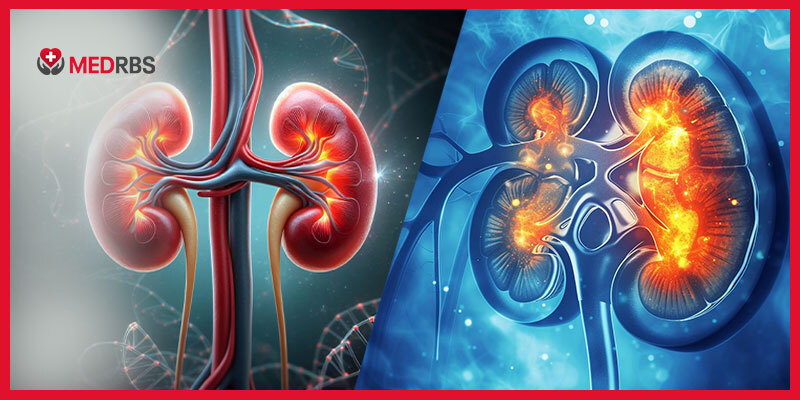Ever mixed up nephrology and urology? It’s common. But, they’re quite different. When considering the specialties of nephrology and urology, it is important to understand what’s the difference between a nephrologist vs urologist.
A urologist is a surgeon who specializes in diagnosing and treating disorders not only of the urinary tract but also of the disorders of the male reproductive system. On the other hand, nephrologists are medical physicians focusing on kidney health, specifically diagnosing and managing diseases of the kidney itself.
While both deal with kidney-related issues, their areas of expertise and treatment approaches vary significantly. Let’s break it down simply in this article.
Nephrology vs. Urology?
Nephrology is a branch of internal medicine focused on the diagnosis and management of diseases that affect the kidneys, such as chronic kidney disease, kidney stones, and conditions that lead to kidney failure like high blood pressure or diabetes.
On the other hand, urology is a surgical specialty that deals with diseases and disorders of the urinary tract in both sexes and the male reproductive system.
What conditions do Urologists Treat?
Urologists treat a wide range of conditions, from urinary incontinence and kidney stones to prostate cancer, playing a key role in managing diseases that treat kidney-related conditions but with a more surgical approach compared to nephrologists. They also handle issues related to the bladder, urethra, and, in males, problems with the testes, prostate, and penis.
For conditions related to the urinary system or male reproductive issues, seeing a urologist would be applicable.
They have expertise in managing a wide variety of conditions, employing both surgical and non-surgical treatments. Some of the primary conditions that urologists treat include, but are not limited to:
- Urinary Tract Infections (UTIs)
- Kidney Stones
- Bladder Issues
- Prostate Conditions
- Erectile Dysfunction (ED)
- Infertility
- Penile Conditions
- Testicular Disorders
- Urinary Incontinence
- Urologic Cancers
- Congenital Urinary Tract Abnormalities
- Interstitial Cystitis
Given the broad spectrum of conditions that urologists focus on, their role is significant in ensuring the proper function of the urinary tract and male reproductive organs. They work closely with patients to diagnose issues accurately and develop comprehensive treatment plans that may include lifestyle changes, medication, or surgery.
What Conditions Do Nephrologists Treat?
Nephrologists treat conditions affecting kidney function and manage dialysis for end-stage renal disease and kidney transplant follow-ups. They also tackle electrolyte disorders and hypertension, as these can affect the kidneys. If you are dealing with kidney disease or high blood pressure that could lead to kidney problems, you may need to see a nephrologist.
Nephrologists specialize in the care of patients with a wide array of kidney-related issues. The conditions treated by nephrologists include, but are not limited to, the following:
- Chronic Kidney Disease (CKD)
- Acute Kidney Injury (AKI)
- End-Stage Renal Disease (ESRD)
- Polycystic Kidney Disease (PKD)
- Glomerulonephritis
- Kidney Stones
- Hypertension
- Electrolyte Disorders
- Renal Artery Stenosis
- Proteinuria and Hematuria
- Kidney Infections
Nephrologists work in conjunction with dietitians, pharmacists, and other healthcare professionals to provide a comprehensive care plan that addresses the complex needs of patients with kidney diseases.
Similarities & Differences between Urology and Nephrology

Despite their differences, nephrology and urology sometimes overlap. Kidney stones and certain kidney infections can require both a nephrologist’s and a urologist’s expertise.
The primary similarity between a urologist and a nephrologist is that both are highly trained urology specialists who play crucial roles in the diagnosis and treatment of diseases related to the kidneys and urinary system. While both include expertise in managing diseases that affect these areas, their focuses diverge significantly.
The distinction essentially lies in the approach towards the condition; the urologist vs nephrologist comparison often comes into play when patients are deciding on specialists for the same condition. While urologists can treat a broad array of conditions including cancers, stones, and infections of the urinary system, nephrologists focus on treating systemic conditions that affect the kidneys like hypertension and chronic kidney disease. They handle the medical management of kidney conditions, whereas urology physicians focus more on surgical interventions. Both types of doctors, however, are essential in the treatment of diseases within their specialized areas, often collaborating to provide comprehensive care.
Why Does This Matter in Medical Billing?
In Medical billing, knowing whether a nephrologist or urologist did a procedure is important. Correctly identifying the specialty prevents billing errors and denied claims. This ensures patients and providers are fairly treated in the billing process.
Billing for Nephrology vs. Urology
When it comes to medical billing, each specialty has unique billing codes for procedures and treatments. Mixing them up can lead to billing mistakes. For instance, billing for a kidney function test differs from billing for a cystoscopy. Knowing which specialty performed the service ensures accurate billing.
Some procedures, like kidney stone removal, can fall under both specialties. Accurate medical coding requires knowing who performed the procedure and why. Correct billing is important. It avoids confusion and ensures that insurance covers the costs properly.
Urology Billing and Coding Procedure
When it comes to urology billing, It involves specific codes known as CPT codes. These codes tell the insurance company what kind of care you received. For example, if a urologist performs a bladder exam, there’s a special code for that. Each procedure, from kidney stone removal to prostate exams, has its own code. Knowing these codes helps ensure the billing process goes smoothly.
Common Urology CPT codes
| CPT Code | Description |
| 52000 | Cystoscopy (examination of the bladder) |
| 52332 | Cystourethroscopy (with insertion of indwelling ureteral stent) |
| 55866 | Laparoscopic radical prostatectomy |
| 51798 | Measurement of post-voiding residual urine and/or bladder capacity by ultrasound, non-imaging |
| 55040 | Excision of hydrocele (scrotal sac of fluid) |
Understand Nephrology Billing and Coding Procedure
Nephrology Medical billing also uses CPT codes, but these are specific to kidney-related care. Whether it’s for regular kidney function tests or more complex treatments like dialysis, each has a unique code. Accurate coding is essential in nephrology to make sure patients and doctors don’t face billing issues. Understanding these codes helps in managing the financial side of kidney care.
Common Nephrology CPT codes
| CPT Code | Description |
| 50200 | Renal biopsy (kidney biopsy) |
| 90935 | Hemodialysis procedure with single physician evaluation |
| 90937 | Hemodialysis procedure requiring repeated evaluation(s) with or without substantial revision of dialysis prescription |
| 90960 | End-stage renal disease (ESRD) related services for dialysis, less than full month of service, per day |
| 99231 | Hospital inpatient follow-up visit, typically 15 minutes spent at the bedside and on the patient’s hospital floor or unit |
Why Should You Outsource Nephrology and Urology Billing and RCM Services?
To avoid billing mistakes and ensure smooth insurance claims, consider outsourcing nephrology and urology billing to a specialized service like Medrbs billing company. This approach can streamline billing processes, improve accuracy, and support better revenue management, making it a smart choice for healthcare providers.
Conclusion
To conclude, nephrology and urology are distinct medical fields, each focusing on different aspects of the body. Nephrologists care for kidney health, while urologists address urinary and male reproductive system issues. Their treatments and procedures have specific billing codes, which can be complex.







